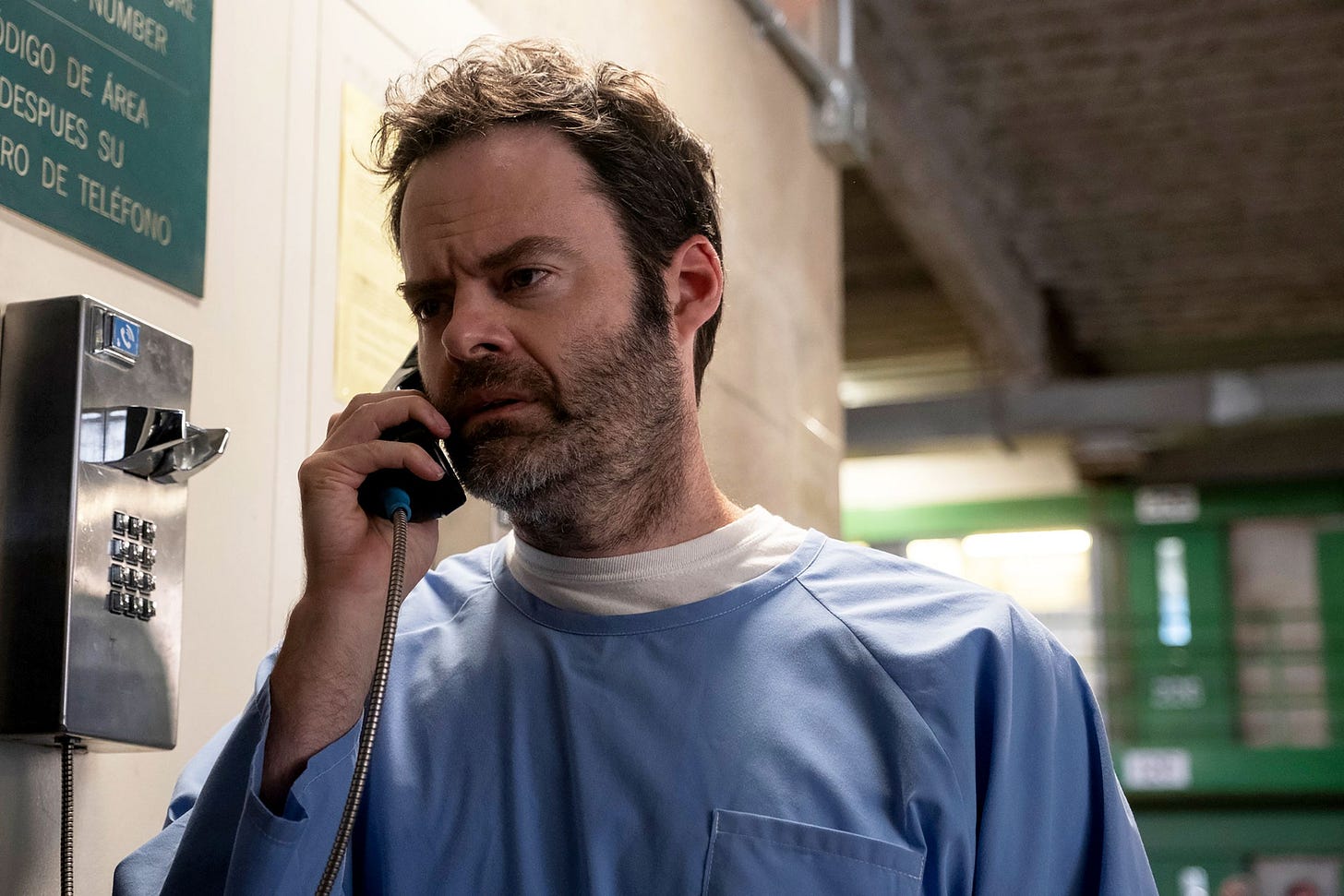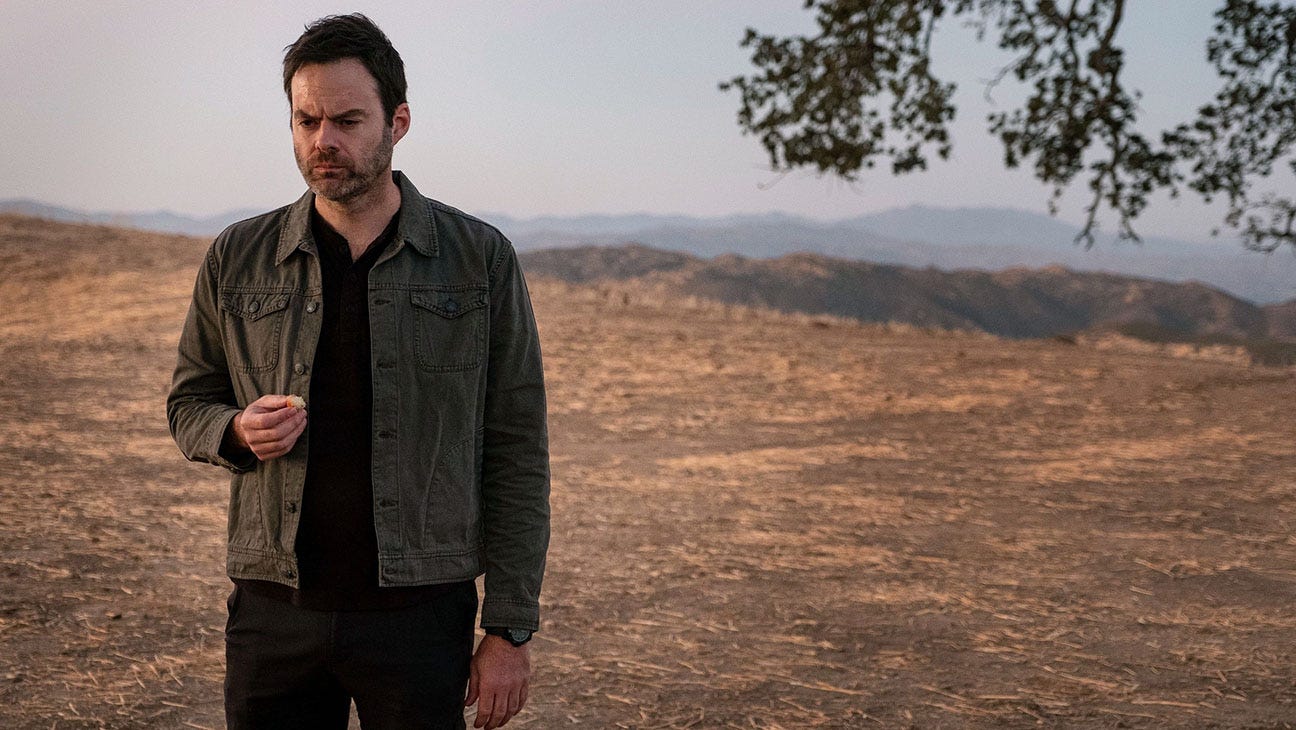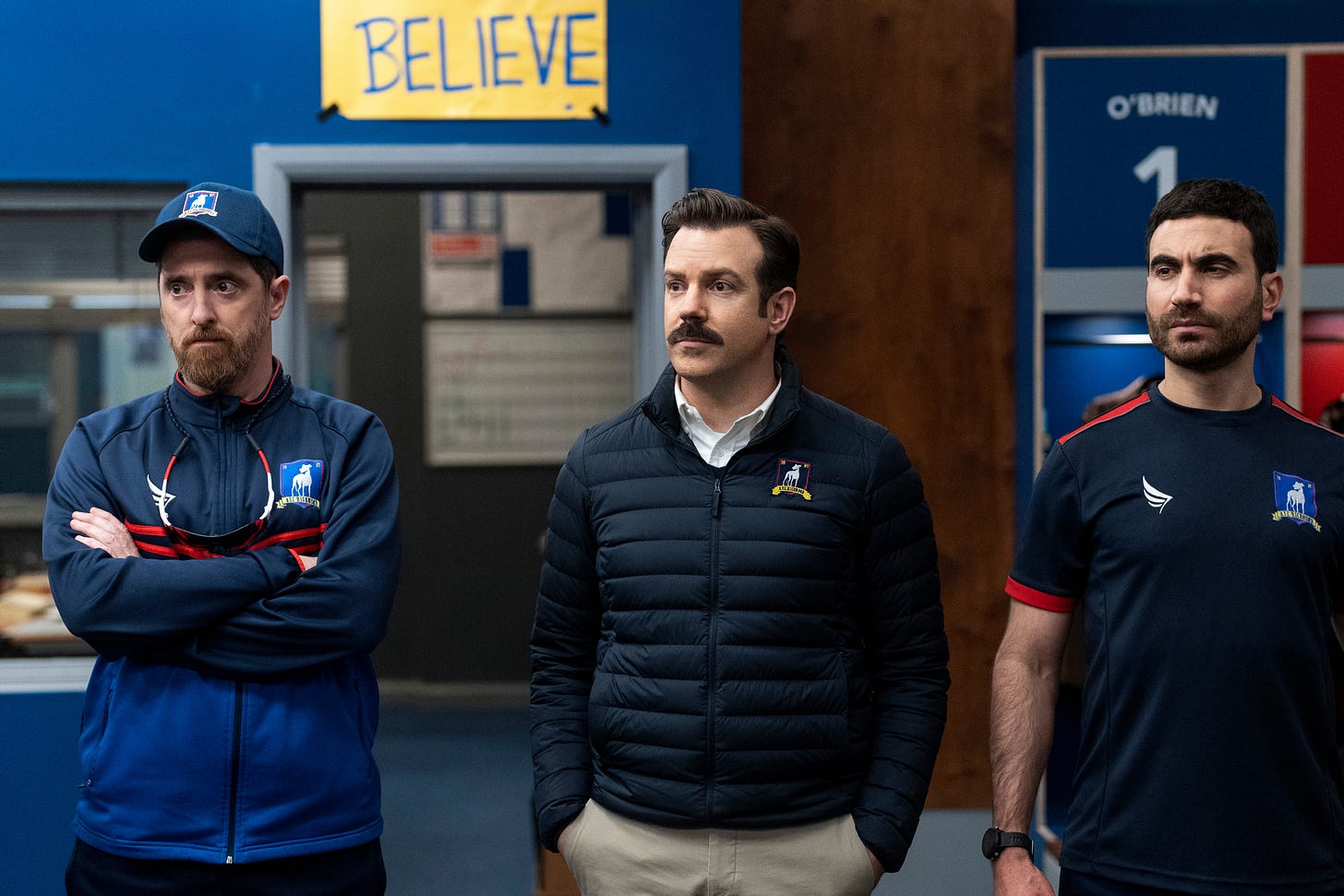Why Barry and Ted Lasso both failed to stick their landings
Heaven knows I tried, but I just couldn’t love the farewell seasons of either. Spoilers for the entirety of both shows below
Fans of Barry, prepare yourselves: in my (very unpopular) opinion, Barry was never a fantastic show. It was a show with many great moments, great performances, and great episodes. NoHo Hank was a breakout character who always had a killer one-liner up his sleeve. Bill Hader proved himself to be an incredible talent, balancing his comedic chops with the emotion of a deeply regretful man who can’t help but unleash his lethal talents, even proving to later excel as a director. It was certainly hilarious at times, suspenseful at others, and was unafraid to take some big risks. Best of all, the series was an unpredictable ride that always looked like it was being made by a group of talented voices, especially as the sharpness of the fourth season’s writing and directing was airing parallel to so many other soulless streaming shows. Directing every episode this season, Bill Hader smoothly created long shots that let you sit in the environment of the setting. Whether it’s to build the unsettling atmosphere or bask in the great cinematography, Hader follows the characters around for long tracking shots that allow him to flaunt his craftsmanship. All of these were the show’s strengths, but as a whole, I never felt like it lived up to what it could have or clearly wanted to be.
Barry was often at odds with itself, never quite striking a perfect balance of its tones. Many of the characters never felt like more than thinly sketched outlines that relied on their actors to bring them to life. The first two seasons definitely charmed in its balance of dark comedy and drama that made it stand out from the rest of HBO’s roster. Aside from a shocking twist here or a memorable set piece there, it never consistently reached those top-tier heights; at times it was too absurd, too slow, not funny enough, not thoughtful enough. The last two seasons suffered from the show taking itself too seriously, wanting to dive headfirst into the darkness and philosophy behind these characters that weren’t deep enough for that. It still retained hints of that pitch-black comedy, and Hader’s performance was strong enough to carry those and his pained regret. By abandoning some of that genre mixing and overall lightness, it resembled more of a traditional crime thriller rather than a distinct creation. It also seemed more obsessed with impressing the audience with its technical prowess and its cinematography, even going so far as to frame entire scenes around them. It abandoned the storytelling that was driven by the consequences of Barry’s actions to set up this image of “prestige TV”.
Another issue I had with this show is the character of Barry Berkman himself. I’ll elaborate on how this tug-and-pull hampered season four below, but in the end, he was never as deep or interesting as he initially seemed. At times, they would have him perform ridiculously callous actions, only to immediately seek redemption for him. The guilt driving his murders in the first two seasons was potent enough, but throughout seasons three and four, his motivation became increasingly more convoluted. This was never more evident in his sudden, ridiculous turn to Christianity, and his thought that his survival in the finale was salvation by God. His self-destructive trend and collapsing mentality hints at him fully losing his mind, only to give him an odd relationship with his son and religion that appeared unearned. He too often felt like the writers were making his characterization up as they went along, culminating to the point that he often seemed like an afterthought. Many of the actions in the final season and finale had nothing to do with him, whereas the first two seasons made a point of how the ramifications of his actions influenced everyone.
The fourth season was divided into two distinct halves, neither of which I thought were entirely successful. The prison arc seemed like a bold move last season that would change up the status quo, but it immediately felt like the writers were working overtime to undo it as quickly as possible. Nothing of much consequence takes place during that run aside from Fuches turning into a gang leader. Speaking of him, his endless flip-flopping quickly turned from amusing to tedious, and showed the writing team obviously straining in order to keep Stephen Root on the show. Barry’s guilt and the consequences of his absence to everyone around him if the season started with him and Sally on the run. As it stands, the writers seemed to have written themselves into a corner at the end of season three’s finale and, aside from one chaotic shootout, they failed to take advantage of the prison setting. The eight-year time jump was at least a bit more of a dynamic choice, and provided some funny moments in the production of a movie based around Barry and Hank’s rivalry with Fuches. But turned out to leave Barry and Sally in an awfully dull place, making both of them some of the least interesting characters in the fold. Also, by doing such a big jump forward, you need more than four half-hour episodes to wrap everything up. It would have been better if the entire season was spent in this time period and allowed us to really marinate in all of the changes that occurred.
Unfortunately, both portions of the season compromised the ultimately unsatisfying finale. I think the only way it truly satisfied was in its commentary about Hollywood and its trend of exploiting real-life tragedies, a satirical bent that always landed across the show’s run (one of the funniest moments in this season came from seeing the real-life director of CODA direct a fictional superhero movie, which served as cutting satire of Marvel’s trend of hiring indie directors for thankless jobs). For the characters, the only one that got a proper resolution was NoHo Hank dying over his battle of the wills with Fuches that escalated into a gunfight (one that cleverly unfolded before Barry arrived), ending with him holding onto the hand of Cristobal’s statue. However, a true absence of Barry’s reunions with Gene and Fuches left Fuches with a real lack of payoff and, as I said above, little for Barry to actually do aside from die in a hilariously quick manner.
Gene’s murder of Barry led to the most underwhelming part of the finale. At the core of this show was the idea of a hitman attempting to leave his past of violence behind him only to continuously get sucked into a life of more crime and murder. But because Barry had very little to do for these past two seasons, it seems Hader and the other writers wanted to lean more into the idea of him corrupting all of the good people in his life. Gene, an innocent acting teacher who enters a life of violence to avenge the death of his girlfriend, is the one most punished by being sent to jail and is perceived as a villain by the entire world, while Barry is forever, wrongfully immortalized. This only works as a commentary on Hollywood, as it’s a remarkably bleak ending to a show that never felt like it was properly building to a conclusion like this. The idea that Gene is forever made the villain while Barry is celebrated only works because Barry has barely changed since the beginning of the series, only descending more and more into heinous acts that abandon some of the themes for the beginning. It’s a conclusion that exposes some of Hollywood’s hypocrisy, but also exposes some of the writers’ shallowness by making most of the arcs on this show just characters sinking lower and lower.
On the other side of the spectrum, we have Ted Lasso, a show whose best ranks up there with the best in television. Season 1 is one of my favorite seasons of television, a breath of fresh air in the dire time of 2020 and a television landscape dominated with antiheroes. Out of nowhere comes this sweet show free of cynicism and with an eternally positive lead who spread messages we all needed to hear. Without becoming corny or naive, they built out an endearing cast of characters in the world of soccer. It was sentimental, funny, and refreshing that we honestly didn’t deserve it. Season 2 wasn’t quite as good and went in directions that weren’t as strong, but was still extremely enjoyable television. It continued to be a joyous breath of fresh air that put a smile on all of our faces. A mustachioed man from Kentucky sounds eye-rollingly cheesy, but it was genuinely wholesome at a needed time. At the same time, it introduced us to Roy, Jamie, Rebecca, Keeley, and more characters that we instantly fell in love with. Imagine my excitement when I pressed play on episode 1, and now imagine my crushing disappointment upon telling you all that season 3 is one of the sharpest declines in quality in recent memory. There was still lots to like here, but the show made some fundamental mistakes that are impossible to overlook.
The biggest problem this season faced was is its scattershot plotting and pacing. With the general departure of Bill Lawrence (who went to oversee his new Apple sitcom Shrinking), it seemed that the show lost his balance of feel-good comedy and drama. Now, the show became self-indulgent in both its running times and handling of the ever-expanding ensemble, devoted to giving every character a subplot of their own. The worst offender of this was the baffling amount of screen time given to Keeley’s office politics. She’s a character most praised for her interactions with Rebecca, Jamie, and Roy. The writers then thought it would be best to put her in an unfunny workplace comedy that steals time from more interesting characters. Rebecca gets a mostly limp story about her wanting to start a family, one that comes to life during her interactions with a Dutch man. It’s also one of the many storylines that gets dropped midway through the season. Shandy is introduced as an extremely annoying friend of Keeley’s, only for her to get written off with no fuss. We spent a whopping three episodes centered on the team drooling over Zava and him having to acclimate to their strategy, only for him to leave unceremoniously and leave little impact on the plot.
Ted’s marriage drama was emotional at first, but became rote when the same issues were constantly rehashed (and it became hard to take seriously when Ted hired a P.I. to follow her to Paris). He still had the same charm and delivered plenty of uplifting moments in the season’s second half, particularly in his backstory with Beard. It did too often feel like he was being dumbed down and, especially in the first few episodes, his bumbling experience as an American coach resembled simple incompetence (I know his lack of football knowledge is part of the joke, but for him to not know basic plays or who legendary player Zava is was pretty ridiculous). Roy, once my personal favorite character, was largely turned into a grunting, stone-faced shell of himself with only sparse heartfelt moments shining through (in other words, he has received the Daryl Dixon treatment). Largely none of the focus was on soccer, even though the episodes all run a full hour long now. The ones that did were some of the most satisfying moments of the season.
Drifting away from the half-hour format has been a mistake, making the episodes far more bloated and self-indulgent than before. Even the sweetness that the show was known for feels more artificial now, desperately trying to force in syrupy emotional cues to recapture the more successful ones of yesteryear. It awkardly attempted to tackle current social issues like race and women’s ownership of their sex tapes, most evident in the team’s cringeworthy locker room debate about the morality of nude pictures (though Colin’s arc about coming out to the team was a poignant one). The team was turned into embarrassingly hackneyed caricatures without a trace of realism to them, which was a shame as their more vulnerable masculinity was once a positive. The show works best when Ted is winning others over; if everyone is a Ted, it becomes too syrupy. It’s as if the writing team worked overtime to make everyone into the cheesiest versions of themselves, whether that’s Dani’s goofy dose of one-note positivity every episode or the team’s dopey rendition of a Sound of Music song as Ted’s parting gift.
But by far the most disappointing element of the season is Nate’s arc. At the end of season 2, Nate’s heel-turn promised a rivalry with Ted after two seasons of his shyness transforming into narcissism. In season 3, we saw not one scene that displayed his coaching style that dubbed him “the wunderkind”. Instead, we’re treated to countless scenes of his meek romance with the hostess at his favorite restaurant. His chemistry-free relationship makes up most of his transformation into villainy, rather than his betrayal of the team leading him to realize how much Ted has done for him. Instead, he immediately reverts back to his mild-mannered self who has less of a redemption arc and more of a loop back to his same personality. He was also subjected to some of the season’s laziest storytelling, which was its odd tendency to have major events occur offscreen. One episode, the team was fueled around pure rage for Nate. A few episodes later, we are told that they have all forgiven him and want to welcome him back with open arms. A throwaway line tells us that Nate has quit West Ham. For all of the extended runtimes this season, they decided to oddly cut away from these pivotal moments.
It wasn’t all bad. I still found plenty of laughs every episode, and all of the performances were still charming as ever. There were still spots that glimmered with the same sentimentality of its glory days, especially in the fantastic episode “Sunflowers”. Set during a night out in Amsterdam, moments like Colin discussing his sexuality with Trent, Rebecca bonding with the Dutch man, and Jamie teaching Roy how to ride a bike captured the earnestness of the first two seasons. Speaking of Jamie, he was one of the few characters improved by this season by bringing his arc full-circle into a selfless player who formed a bromance with Roy. The last few episodes were also a surprisingly touching resolution, rebounding from its slump with the sentimentality of its early days. Moments like Beard’s confession to Nate, Ted’s heartfelt conversation with his mother, the final soccer match of the season, and the closing moments of the last episode hit surprisingly hard. It was what I wanted from the ending of the show, and had the passion needed to say goodbye to all of the characters we loved. Unlike Barry, it ended on a definite high note.
It seems that many have been overjoyed about the show’s rapid decline in quality, excited that they finally had a good reason to hate a show that prided itself on positivity. Trust me, I take no pleasure in writing about the many issues that dragged this season down. It seems to me that with the extended running times, subplots, and heavy-handed attempts at optimism, Ted Lasso got caught up in its own hype and its many award wins made them think that everything that they had written was gold. There is such a thing as too much, though, and I think that’s where this show forgot its strengths. Both Ted Lasso and Barry both lost some of themselves this year, making for the weakest seasons of both shows. I do think that both of them had strong, very respectable runs that weren’t tarnished by their disappointing final seasons. Trust me, I went into both of these seasons hoping to love them. Heaven knows I tried, but I couldn’t bring myself to love the final seasons of either.
Barry (season 4) grade: B-
Ted Lasso (season 3) grade: B-
More from Almost A Critic
Can The Boys Ever Move Beyond Homelander?
The 15 best action scenes from the John Wick franchise
Something Wicked this way comes in the impeccable action triumph John Wick: Chapter 4
This Weekend On-Screen: We’ve got a lot to catch up on, don’t we?
I just finished watching Lost for the first time, and I have thoughts
M. Night Shyamalan knocks it out of the park with Knock at the Cabin




